
Mesoxantha is a genus of nymphalid butterflies. It is monotypic, containing only Mesoxantha ethosea, the Drury's delight. It is found in Sierra Leone, Guinea, Liberia, Ivory Coast, Ghana, Togo, Nigeria, Cameroon, Gabon, the Republic of the Congo, the Central African Republic, Angola, the Democratic Republic of the Congo, Sudan, Uganda, Tanzania and Mozambique. The habitat consists of lowland forests, including secondary forests.
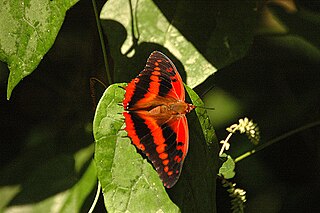
Charaxes cynthia, the western red charaxes, is a butterfly in the family Nymphalidae. It is found in Senegal, Guinea, Sierra Leone, Liberia, Ivory Coast, Ghana, Nigeria, Cameroon, Gabon, the Republic of the Congo, the Central African Republic, the Democratic Republic of the Congo, Uganda, Angola, Sudan, Uganda, Kenya, Tanzania and Zambia.

Antanartia delius, the forest admiral or orange admiral, is a butterfly in the family Nymphalidae. It is found in Senegal, Sierra Leone, Liberia, Ivory Coast, Ghana, Nigeria, Cameroon, Equatorial Guinea, the Republic of the Congo, Angola, the Democratic Republic of the Congo, Uganda, Kenya, and Tanzania. The habitat consists of lowland forests.
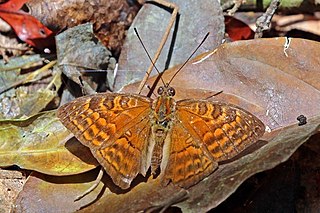
Euriphene gambiae, the Gambia nymph, is a butterfly in the family Nymphalidae. It is found in Senegal, Guinea-Bissau, Guinea, Sierra Leone, Liberia, Ivory Coast, Ghana, Nigeria, Cameroon, Gabon, the Republic of the Congo, Angola and the Democratic Republic of the Congo. The habitat consists of forests.

Euphaedra medon, the widespread forester, is a butterfly in the family Nymphalidae. It is found in Senegal, the Gambia, Guinea-Bissau, Guinea, Sierra Leone, Liberia, Ivory Coast, Ghana, Togo, Benin, Nigeria, Cameroon, Equatorial Guinea, Gabon, the Republic of Congo, Angola, the Democratic Republic of the Congo, Sudan, Ethiopia, Uganda, Kenya, Tanzania and Zambia.

Euphaedra harpalyce, the common blue-banded forester, is a butterfly in the family Nymphalidae. It is found in Guinea-Bissau, Guinea, Sierra Leone, Liberia, Ivory Coast, Ghana, Togo, Benin, Nigeria, Cameroon, Equatorial Guinea Gabon, the Central African Republic, Angola, the Democratic Republic of the Congo, Sudan, Uganda, Rwanda, Tanzania and Zambia.

Euphaedra eleus, the Eleus orange forester, is a butterfly in the family Nymphalidae. It is found in Guinea, Sierra Leone, Liberia, Ivory Coast, Ghana, Nigeria, Cameroon, Gabon, the Republic of the Congo, Angola, the Democratic Republic of the Congo and Uganda. The habitat consists of primary forests and secondary forests with a closed canopy.

Euphaedra perseis, the Perseis mimic forester, is a butterfly in the family Nymphalidae. It is found in Guinea (Conakry), Sierra Leone, Liberia, Ivory Coast and western Ghana. It was first described by Dru Drury in 1773.
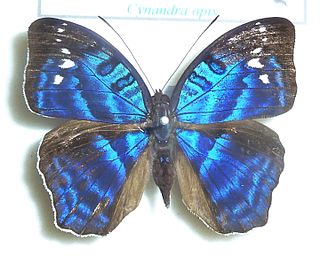
Cynandra opis, the brilliant nymph, is a butterfly in the family Nymphalidae. It is the only species in the monotypic genus Cynandra. It is found in Guinea, Sierra Leone, Liberia, Ivory Coast, Ghana, Togo, Nigeria, Cameroon, Gabon, the Republic of the Congo, the Central African Republic, Angola, the Democratic Republic of the Congo, Uganda and Tanzania. The habitat consists of dense forests.

Pseudacraea hostilia, the western incipient false acraea, is a butterfly in the family Nymphalidae. It is found in Sierra Leone, Liberia, Ivory Coast and western and central Ghana. The habitat consists of wetter forests.
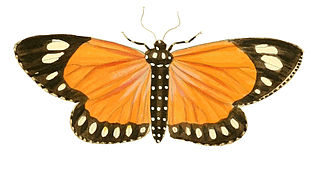
Scopula helcita is a moth of the family Geometridae first described by Carl Linnaeus in his 1763 Centuria Insectorum. It is found in Cameroon, the Republic of the Congo, the Democratic Republic of the Congo, Equatorial Guinea, Ghana, Nigeria, Sierra Leone, South Africa and Uganda.
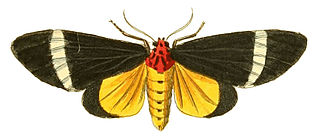
Caryatis phileta is a moth of the subfamily Arctiinae. It was described by Dru Drury in 1782. It is found in Cameroon, the Democratic Republic of the Congo, Gabon, Ghana, Nigeria and Sierra Leone.

Pitthea famula is a species of moth in the family Geometridae. It was first described by Dru Drury in 1773 from Calabar, in what is now Nigeria. It is found in Angola, Benin, Cameroon, the Republic of the Congo, the Democratic Republic of the Congo, Equatorial Guinea (Bioko), Nigeria, Sierra Leone and Zambia.

Imbrasia epimethea is a species of moth belonging to the family Saturniidae. It was first described by Dru Drury in 1773 from the Calabar coast.

Crameria is a monotypic moth genus in the family Noctuidae erected by Jacob Hübner in 1819. Its only species, Crameria amabilis, was first described by Dru Drury in 1773.

Otroeda cafra is a species of moth in the tussock-moth subfamily Lymantriinae. It was first described by Dru Drury in 1782 from Sierra Leone, and is also found in Cameroon, DR Congo, Malawi, and Nigeria.

Otroeda nerina is a species of moth in the tussock-moth subfamily Lymantriinae. It was first described by Dru Drury in 1782 from Sierra Leone, and is also found in Cameroon, DR Congo, Gabon, Ghana and Nigeria.

Pseudobunaea alinda is a species of very large moths in the family Saturniidae. The species was first described by Dru Drury in 1782, and is found in Angola, Cameroon, Congo, DR Congo, Gabon, Guinea, Ivory Coast, Sierra Leone, and Tanzania.

Lobobunaea phaedusa is a species of very large moths in the family Saturniidae. It is found in much of sub-saharan Africa, where its host plants include African custard-apple, crown-berry, and Aframomum spp.
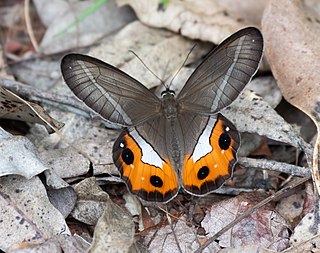
Pierella nereis is a butterfly species from the subfamily Satyrinae in the family Nymphalidae. It was first described by Dru Drury in 1782 from Brazil.




















